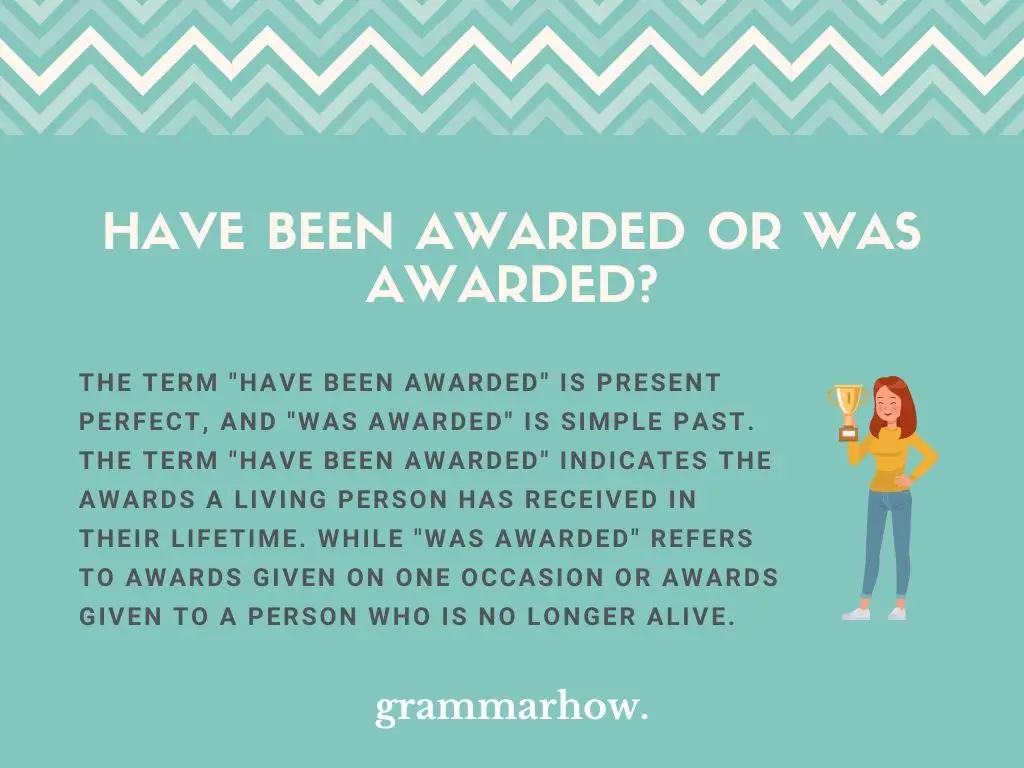Are you struggling to understand the difference between “have been awarded” and “was awarded?”
Well, you shouldn’t despair because this page describes both terms in detail and explains the difference between them with examples.
Have Been Awarded or Was Awarded?
The term “have been awarded” is present perfect, and “was awarded” is simple past. The term “have been awarded” indicates the awards a living person has received in their lifetime. While “was awarded” refers to awards given on one occasion or awards given to a person who is no longer alive.

Let’s start with the term “have/has been awarded.”
This is an example of the present perfect tense. Therefore, it refers to events that happened in the past but still have a connection to the present.
As shown in these examples
- We have been awarded the prize for the best team of the year since 2018.
- We have been awarded the project by the local government.
- She has been awarded a Ph.D.
Concerning “was awarded,” this is simple past, which means that the event or time period is finished and usually only happened once.
Also, if a person dies, you would automatically have to switch from present perfect to simple past if referring to them being “awarded” something.
- She was awarded a phD. in 2008.
- I was awarded a certificate for swimming when I was ten.
- My grandfather was awarded a bravery medal by the military.
Usually, it refers to events that happened just once. However, you can add other words to indicate multiple instances.
- During his lifetime, he was awarded three Oscars for Best Director.
- She was awarded several certificates for excellence during her career at the school.
Keep reading to learn more about how to use simple past and present perfect so that you don’t get the two tenses confused in your writing.
Have Been Awarded
The term “have been awarded” is an example of the present perfect tense.
This tense is used to talk about events that have happened over time or events from the past with some connection to the present.
That “connection” can be vague in that simply being alive connects you to the present.
For example:
- I have been awarded a certificate for the IT course I was doing. (Indicates that it happened recently)
- We have been awarded the project. (Indicates that it happened recently)
- I have been awarded a Ph.D. (Either recently or in my lifetime)
However, if we mention a time from the past that is finished, we must use simple past.
- I was awarded a phD. in 2008. (Mentioning a specific period that is finished)
Also, if a person is not living, you cannot use “have been” to talk about their awards.
For example:
- I have been awarded many certificates so far in my life.
- He was awarded many prizes for his photographs while he was alive.
Was Awarded
The term “was awarded” is an example of simple past tense. This tense is used to talk about events or time periods in the past that are finished or complete.
- She was awarded the prize for the Best Dancer of her generation.
- He was awarded the trophy for Player of the Year in 2002.
Often, in this tense, the event happened only once. However, you can add other words to show that things happened more than once.
- He was awarded the trophy for Player of the Year several times during his career. (His career is over)
- He has been awarded the trophy for Player of the Year several times during his career. (His career is not over)
Furthermore, when somebody is deceased, you should always use a simple past to refer to their actions or achievements.
However, just because you use simple past to refer to deceased people doesn’t mean that the person is “always” deceased in every simple past sentence.
For example:
- She was awarded a scholarship to Harvard. (No indication of whether living or deceased)
- Before her death, she was awarded an honorary degree from Harvard. (deceased)
Conclusion
“Have been awarded” implies that something was “awarded” recently or multiple times over a long period. If referring to a person, that person must be alive for you to use this present perfect tense.
The term “was awarded” refers to periods or events that are over and that usually happened on a single occasion. So when using “was awarded,” you would usually mention “when” the thing “was awarded.”

Martin holds a Master’s degree in Finance and International Business. He has six years of experience in professional communication with clients, executives, and colleagues. Furthermore, he has teaching experience from Aarhus University. Martin has been featured as an expert in communication and teaching on Forbes and Shopify. Read more about Martin here.
